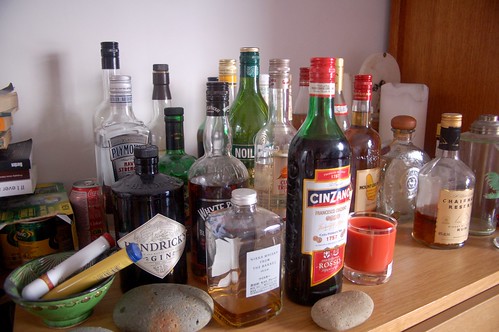Over the years I’ve acquired a lot of fairly useless, other than aesthetically, stuff; half a dozen vintage sewing machines, a typewriter, a green fibreglass dressmakers dummy, etc. All stuff I deeply love with so much nostalgia and narrative attached to it I initially wondered how I would give any of it up. But give it up I must, as I prepare to decant my life into storage and spend a month (not too long, I know) in the States.
First I sold a suit; the suit my mom had bought me for my uni interviews, and which informed a lot of my suit tastes. Oh, the times I had had wearing that suit. What’s more, it’s more than ample fitting proved to me I’d at least managed a little weight loss at some point.
So the suit’s value is in reminding me of a few well learned lessons, and being the hook for some stories that are now a part of the tapestry of my life; I try to avoid being a big anecdotalist, and a pared down set of the stories I told myself seems wise; these things have become tacit. Off the suit went, and a load went from my shoulders. Getting rid of stuff is easy.
As Sam Hughes at Things of Interest puts it:
But it may make you happier. It is not a weight off my soul, but it is a weight off my mind not to have too much to worry about.
I have very little storage space, so, the less stuff I have, the more room I have for myself.
I can’t stand clutter, so the less stuff I have, the more space there is on the table for works-in-progress, and the easier it is to clear it entirely in preparation for a meal.</blockquote> Cruft is what comp sci people refer to as when a piece of software slowly builds up distracting and confusing code; stuff for handling edge cases that never occur now, weird dependencies and utility classes filled with cryptic comments and version control artefacts. It’s, arguably, why Apple made such a great decision when they went to OSX, and why Vista failed; way too much cruft to support older applications that the whole OS was too slow. (Here’s the jargon file entry)
But cruft, as a concept, has wider implications. Think of it as ‘accretion’; the slow building up of barnacles on the hull of a ship that, at some point, necessitate dry dock, scraping back to bare metal and some new means to stave off the inevitable biofouling for a few more months.
It’s possible to deal with cruft in an ongoing fashion, sure, but sometimes a good refactoring is what you need, whether it’s your code base, your ships hull, or, indeed, the pile of crap you lug from rented house to rented apartment. Which is what I’m doing.
Unfinished projects; I’ve got ‘em. What to do with the vintage electric thing that could/should/might become a clock, or the scattered few breadboards for proof of concepts. Also, the unfinished books, half sewn things, half hemmed trousers and other debris of someone who is, frankly, better at starting than finishing. These things are the worst; guilt, staring at me from the top shelf of a wardrobe and the stacked bits on the side of my desk. Triage, I suspect, has to be the answer here. Sit down, work out the big rocks and the small pebbles, leave enough stuff to finish something useful and/or awesome, and ditch the rest. Maybe I didn’t need that nixie tube clock anyway.
It feels good to have a clear out. Cathartic, not painful, and potentially lucrative, if I can work out the ebay tides. Storage is cheap, leaving stuff at your parents even more so. Get rid of the big stuff first, keep anything small that makes you smile and rip any media you can.
And of course, some acquisitions are more fun to get rid of than others.
